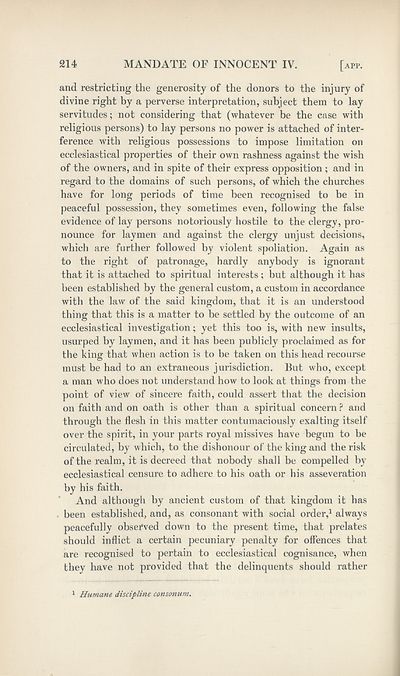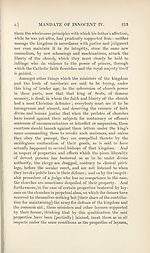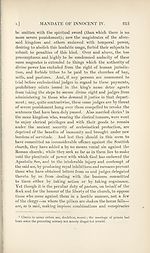Series 1 > Statutes of the Scottish Church, 1225-1559
(335) Page 214
Download files
Complete book:
Individual page:
Thumbnail gallery: Grid view | List view

214 MANDATE OF INNOCENT IV. [app.
and restricting the generosity of the donors to the injury of
divine right by a perverse interpretation, subject them to lay
servitudes; not considering that (whatever be the case with
religious persons) to lay persons no power is attached of inter¬
ference with religious possessions to impose limitation on
ecclesiastical properties of their own rashness against the wish
of the owners, and in spite of their express opposition ; and in
regard to the domains of such persons, of which the churches
have for long periods of time been recognised to be in
peaceful possession, they sometimes even, following the false
evidence of lay persons notoriously hostile to the clergy, pro¬
nounce for laymen and against the clergy unjust decisions,
which are further followed by violent spoliation. Again as
to the right of patronage, hardly anybody is ignorant
that it is attached to spiritual interests; but although it has
been established by the general custom, a custom in accordance
with the law of the said kingdom, that it is an understood
thing that this is a matter to be settled by the outcome of an
ecclesiastical investigation; yet this too is, with new insults,
usurped by laymen, and it has been publicly proclaimed as for
the king that when action is to be taken on this head recourse
must be had to an extraneous jurisdiction. But who, except
a man who does not understand how to look at things from the
point of view of sincere faith, could assert that the decision
on faith and on oath is other than a spiritual concern ? and
through the flesh in this matter contumaciously exalting itself
over the spirit, in your parts royal missives have begun to be
circulated, by which, to the dishonour of the king and the risk
of the realm, it is decreed that nobody shall be compelled by
ecclesiastical censure to adhere to his oath or his asseveration
by his faith.
And although by ancient custom of that kingdom it has
been established, and, as consonant with social order,1 always
peacefully observed down to the present time, that prelates
should inflict a certain pecuniary penalty for offences that
are recognised to pertain to ecclesiastical cognisance, when
they have not provided that the delinquents should rather
Humane discipline consonum.
and restricting the generosity of the donors to the injury of
divine right by a perverse interpretation, subject them to lay
servitudes; not considering that (whatever be the case with
religious persons) to lay persons no power is attached of inter¬
ference with religious possessions to impose limitation on
ecclesiastical properties of their own rashness against the wish
of the owners, and in spite of their express opposition ; and in
regard to the domains of such persons, of which the churches
have for long periods of time been recognised to be in
peaceful possession, they sometimes even, following the false
evidence of lay persons notoriously hostile to the clergy, pro¬
nounce for laymen and against the clergy unjust decisions,
which are further followed by violent spoliation. Again as
to the right of patronage, hardly anybody is ignorant
that it is attached to spiritual interests; but although it has
been established by the general custom, a custom in accordance
with the law of the said kingdom, that it is an understood
thing that this is a matter to be settled by the outcome of an
ecclesiastical investigation; yet this too is, with new insults,
usurped by laymen, and it has been publicly proclaimed as for
the king that when action is to be taken on this head recourse
must be had to an extraneous jurisdiction. But who, except
a man who does not understand how to look at things from the
point of view of sincere faith, could assert that the decision
on faith and on oath is other than a spiritual concern ? and
through the flesh in this matter contumaciously exalting itself
over the spirit, in your parts royal missives have begun to be
circulated, by which, to the dishonour of the king and the risk
of the realm, it is decreed that nobody shall be compelled by
ecclesiastical censure to adhere to his oath or his asseveration
by his faith.
And although by ancient custom of that kingdom it has
been established, and, as consonant with social order,1 always
peacefully observed down to the present time, that prelates
should inflict a certain pecuniary penalty for offences that
are recognised to pertain to ecclesiastical cognisance, when
they have not provided that the delinquents should rather
Humane discipline consonum.
Set display mode to:
![]() Universal Viewer |
Universal Viewer | ![]() Mirador |
Large image | Transcription
Mirador |
Large image | Transcription
Images and transcriptions on this page, including medium image downloads, may be used under the Creative Commons Attribution 4.0 International Licence unless otherwise stated. ![]()
| Scottish History Society volumes > Series 1 > Statutes of the Scottish Church, 1225-1559 > (335) Page 214 |
|---|
| Permanent URL | https://digital.nls.uk/126921006 |
|---|
| Attribution and copyright: |
|
|---|
| Description | Over 180 volumes, published by the Scottish History Society, containing original sources on Scotland's history and people. With a wide range of subjects, the books collectively cover all periods from the 12th to 20th centuries, and reflect changing trends in Scottish history. Sources are accompanied by scholarly interpretation, references and bibliographies. Volumes are usually published annually, and more digitised volumes will be added as they become available. |
|---|


